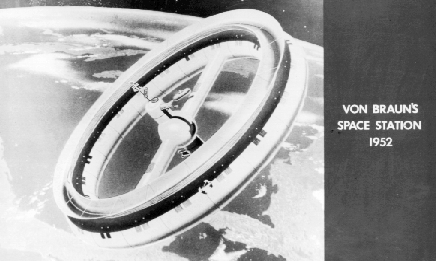Credit & Copyright: Courtesy
NASA/MSFC Historical Archives
Explanation:
Orbiting 1,075 miles above the Earth, a 250 foot wide, inflated,
reinforced nylon "wheel"
was conceived in the early 1950s to function
as a navigational aid, meteorological station, military platform, and
way station for space exploration by rocket pioneer
Wernher von Braun.
The wheel-shaped station could be easily rotated creating artificial
gravity so that the astronauts would not suffer the effects of
prolonged weightlessness.
Von Braun and his team favored building a
permanently occupied
Earth orbiting space station from which to stage a lunar exploration
program.
But in the 1960s NASA adopted
the Apollo Program, which called for
astronauts to transfer to a landing vehicle after achieving lunar
orbit, bypassing the construction of von Braun's wheel.
1999 2000 2001 2002 2003 2004 2005 2006 2007 2008 2009 2010 2011 2012 2013 2014 2015 2016 2017 2018 2019 2020 2021 2022 2023 2024 2025 |
Yanvar' Fevral' Mart Aprel' Mai Iyun' Iyul' Avgust Sentyabr' Oktyabr' Noyabr' Dekabr' |
NASA Web Site Statements, Warnings, and Disclaimers
NASA Official: Jay Norris. Specific rights apply.
A service of: LHEA at NASA / GSFC
& Michigan Tech. U.
|
Publikacii s klyuchevymi slovami:
space station - Wernher von Braun - Apollon - kosmicheskaya stanciya
Publikacii so slovami: space station - Wernher von Braun - Apollon - kosmicheskaya stanciya | |
Sm. takzhe:
Vse publikacii na tu zhe temu >> | |
